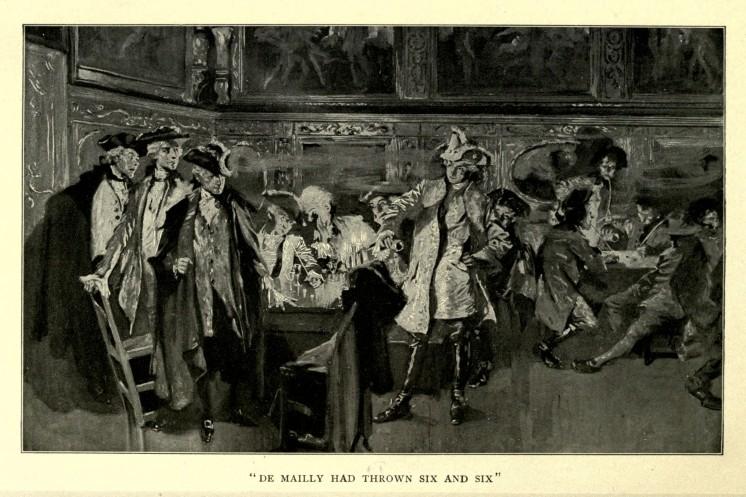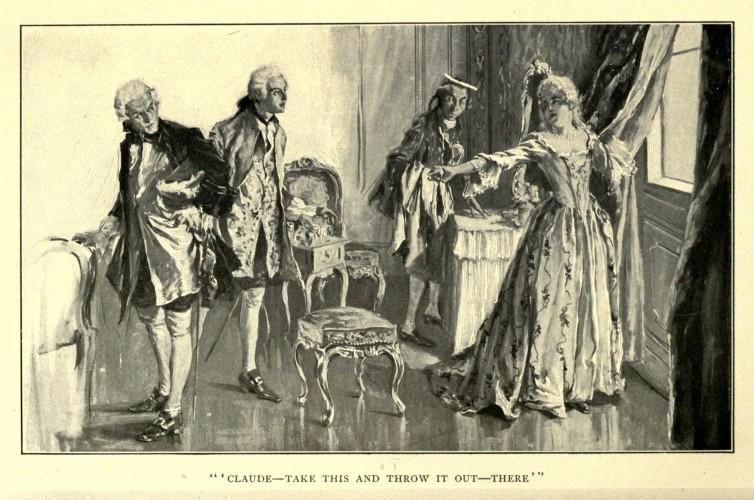Random
documents with unrelated content Scribd suggests to you:
The Count glanced round the circle, noting each face in turn. Baron d'Holbach was engaged with snuff. The other faces, excepting only de Berryer's, were blank. But Richelieu's eyes met those of Claude, and the head of the King's favorite gentleman shook, ever so slightly, at the rebellion in the Count's face. Then, very slowly, de Mailly unfastened his coat and drew from its place the glove of Mme. de Châteauroux. He laid it on the table beside the star.
"We play!" cried his Majesty, smiling as he seized the leathern cup. He shook well, and dropped the dice vigorously before him.
"Seven!" cried the company. It was four and three.
Claude received the implements from the King's hands, tossed and threw.
"Eight!" was the return. It was three and five.
The King bit his lip, and hastily played again. The cubes stared up at him impudently. On one was a three, on the other a one. None spoke, for Louis frowned.
Claude was very sober but very composed as he tried his second chance. It seemed that he could not but win. The courtiers hung quietly on the play. When the cup was lifted from the dice there was a series of exclamations. Claude himself laughed a little, and the King drew a long sigh of relief. Two and one had de Mailly thrown.
It was Henri who voiced the general interest. "You are even," he said, quietly.
The King suddenly rose to his feet. "Not for long!" he exclaimed. For some seconds he rattled the dice in the box, not attempting to conceal his palpable nervousness. When the black spots which lay uppermost were finally counted, a smile broke over the royal lips. Ten points he had made this time.
De Mailly, who had also risen, looked at them for a second with compressed lips, but did not hesitate in his throw. Like de Gêvres, he dropped the squares before him with pointed delicacy. Then he stepped
quietly back, with a throb at his heart, but no change in his face. Not a courtier spoke.
"We will play again!" cried the King, loudly, for they were, indeed, no longer even. M. de Mailly had thrown six and six.
"DE MAILLY HAD THROWN SIX AND SIX
"Pardon, your Majesty," said Claude, in reply to the King's voiced desire. "I could not play again against France and hope to win, though by but a single point. Therefore I beg that you will spare my humiliation, and accept the gauntlet as proof of your gracious forgiveness of my daring."
At this Richelieu looked open-faced approval upon the Count; and de Gêvres and d'Epernon, who had been roused from their ordinary state of ennui by the pretty comedy played before them, glanced at each other with appreciation of so excellent an act of courtiership.
"Monsieur le Comte, if I accept your generosity, it must only be on condition that, as gage of my esteem for you, and our mutual good-will, you wear this star. Permit me to fasten it upon your coat."
The small ceremony over, and the light of royal favor glittering in the candle-rays over the Count de Mailly's heart, his Majesty, with tender touch, took up the coveted gauntlet, put it inside his embroidered waistcoat, and, placing his hand on de Berryer's shoulder, bowed a good-night to the party and the Hôtel de Gêvres.
Immediately after the King left, the other participant in the struggle for a woman's gage also rose. Claude was tired. He had no mind to be assailed with the volley of epigrams, bons-mots, and various comments that he knew would soon begin to be discharged from the brains of his companions. Certainly, he should have considered the episode a happy one. Already, since that talk of esteem and good-will from the King, he could feel the change in attitude assumed towards him by de Gêvres and d'Epernon. But the sight of these figures wearied him now; and he suddenly longed for a solitude in which to face his rapidly growing regret that his cousin's glove had passed out of his possession.
"What, monsieur!" cried de Gêvres, when he rose, "you will not give me the chance to retrieve myself to-night?"
"Small hope for you with such luck as the Count's," returned d'Holbach. "When a man wins two points off a king, by how much may he defeat a duke? Reply, Richelieu. It is geometry."
Richelieu laughed. "I congratulate you, Monsieur le Comte," he said.
De Mailly bowed. Then, turning to the Marquis, he held out his hand. "Will you come, Henri, or must I beg shelter of Madame la Marquise alone?"
"I come, Claude. Good-night, and thanks for a most charming evening, and a comedy worthy of Grandval, messieurs."
"Thank thy sister for that," returned de Gêvres.
Claude made a general salute, and then, without further parley, accompanied his friend from the room and the house.
"My horse is still at the Procope," observed Claude at the door.
"No, I ordered it sent to my hôtel before we left the café."
"We walk, then?"
"I am afraid so. I did not think to order my coach, and not a chair will be obtainable on such a night."
"It is as well. The exercise will be a relief."
They started at a good pace up the long, wide thoroughfare that bordered the river, and walked for some minutes in a silence that was replete with sympathy. It was some distance from the gambling-house to the Hôtel de Mailly, Henri's abode, which was situated on the west bank of the Seine, on the Quai des Théatins, just opposite the Tuileries, on the Pont Royal. The wind was coming sharply from the east, bringing with it great, pelting raindrops that stung the face like bullets. Henri was glad to shield his head from the cutting attack by holding his heavy cloak up before it. Ordinarily the walk at this hour would have been one of no small danger; but to-night even the dwellers in the criminal quarter were undesirous of plying their midnight trade by the river-bank. The cousins had passed the dark cluster of buildings about the old Louvre before either spoke. At length, however, the Marquis broke silence.
"Claude, you have passed a point in life to-day, I think."
"With the two that I won from the King, Henri?"
"Those and the gauntlet of Marie Anne."
There was a little pause. Then Claude said, in a tone whose weary monotony indicated a subject so often thought of as to be trite even in expression:
"Do you—ever regret—that Anne went the way—of the other two? Will she—do you think, finish as did poor little Pauline? Or—will some other send her from her place—as—she did—my brother's wife, Louise?"
As Claude had hesitated over the questions, so was Henri long in making reply. "I do not allow myself, Claude, to wonder over might-have-beens. There is a fate upon our family, I think. But of the three of our women who have gone her way, Marie is the fittest of them all for her place. Little Pauline—Félicité, we named her—her death—my God, I do not like to think of it! And poor, weak Louise—your brother loved her dearly, Claude. And he is dead, and she—is making her long penance in that great tomb of the Ursulines. Heigh-ho! Thank the good God, my cousin, that you have neither sister nor wife in this Court of France. There is not one of them can withstand the great temptation. Our times were not made for the women we love."
And for the rest of their walk both men thought upon these same last words, which, through Claude's head, at least, had begun to ring like a dark refrain of prophecy, of warning: "Our times were not made for the women we love."
It was half an hour past midnight when the Marquis pounded the knocker on the door of his hôtel by the Seine. It was opened with unusual readiness by the liveried porter, who betrayed some surprise at sight of those who waited to enter.
"Oh, my lord is not at Versailles!"
"As you see, we are here," returned Henri, adding, "My apartment is ready?"
"Certainly, Monsieur le Marquis' apartment is ready."
"And one for Monsieur le Comte?"
The servant bowed.
"Light us up, then. Claude, will you have supper?"
"No. Nothing more to-night."
"Very well. Gaillard, is madame visible?"
The porter coughed. "Madame la Marquise was at Mme. de Tencin's till late. Madame, I think, is not visible."
Mailly-Nesle shrugged his shoulders, and proceeded to the staircase. As the servant followed with a candelabrum he made a curious, soft noise in his throat. Forthwith a footman glided swiftly into the hall from an antechamber, and took the other's place beside the door as if waiting for some one. Both nobles saw it. Neither spoke.
Five minutes later Claude was alone in his room. Henri had left him for the night, and he refused the services of a lackey in lieu of his own valet, who was at Versailles. The servant had lighted his candles, and a wood-fire burned in the grate. His wet coat had been carried away to dry. His hat, surtout, and gloves lay upon a neighboring chair. Amid the lace of his jabot glittered the jewelled star which, two hours ago, had flashed upon the breast of the King of France. Claude seated himself, absently, in a chair beside the cheerily crackling fire, facing a great picture that hung upon the brocaded wall. It was Boucher's portrait of Marie Anne de Mailly-Nesle, Marquise de la Tournelle, Duchesse de Châteauroux. She looked down upon him now in that calmly superb manner which she had used only this morning; the manner that the Court had raved over, that women vainly strove to imitate, that had conquered the indifference of a king. And as Claude de Mailly gazed, his own air, shamed perhaps by that of the woman, fell from him, as a sheet might fall from a statue. In one instant he was a different thing. He had become an individual; a man with a strong mentality of his own. The courtier's mask of imperturbable cynicism, the conventional domino of forced interest, the detestable undergarments of necessary toadyism, all were gone. Not the patch on his face, not the height of his heels, not the whiteness of his hands nor the breadth of his cuffs could make him now. Perhaps she whose painted likeness was before him would no more have cared to know him as he really was than she would have liked the words that he uttered, dreamily, before her picture. But it was the true Claude, Claude the man, nevertheless, who repeated aloud the thought in his heart:
"Our times are not made for the women we love."
Toilet
Dawn, the late dawn of a gray, wintry morning, hung over Versailles. Within the palace walls those vast corridors, which had lately rung to sounds of life and laughter, stretched endlessly out in the ghostly chill of the vague light. Chill and stillness had crept also under many doors; and they breathed over that stately room in which Marie Anne de Châteauroux was accustomed to take the few hours of relief from feverish life granted her by kindly sleep.
Though the favorite's apartment was as dark as drawn curtains could make it, nevertheless a thin gleam of gray shot relentlessly between hanging and wall, and, falling athwart the canopied bed, announced that madame's temporary rest approached its end. Against this decree, however, madame's attitude would seem to rebel. She lay, apparently in profound sleep, in the very centre of the great bed, sheets and cover drawn closely about her, up to her throat. Only one hand, half hidden in lace, and her head, with its framing mass of yellow, powder-dulled hair, were visible. In her waking life that head of the Duchess of Châteauroux was celebrated for its marvellous poise. And even now, as it lay relaxed upon the pillow, the effect of its daytime majesty was not quite lost. Viewed thus, devoid of animation or expression, the pure, classic beauty of the face showed to better advantage, perhaps, than at another time. Already, however, ennui, and the constant effort at appearance of pleasure, had left their marks upon the regular features; and, indeed, much other than mere beauty might be found in the countenance. If there were power in the breadth of the forehead, there was too much determination in the chin; while at each corner of the delicate mouth a faint line gave a cast of resolution, dogged and relentless, to the feminine ensemble.
Presently, as the shadows melted more and more, the woman's silkenlashed eyes fell open, and the first of her waking thoughts was expressed in a long, melancholy sigh.
The duties of the Duchess as Lady of the Palace of the Queen necessitated her presence at the grand toilet of her Majesty on Monday, Wednesday, and Friday. On Tuesday, Thursday, and Sunday, therefore, except on those weeks when she was in constant attendance on Louis' consort, the Châteauroux accustomed the Court to a toilet of her own, which the King's faction religiously frequented, while the Queen's circle, the religious party, rolled their eyes, clasped their hands, violently denounced the insolence of it, and fervently wished that they might go, too. Certainly madame's morning receptions were eminently successful, and, however much gentle Marie Leczinska might disapprove of them in secret, she never had the courage to anger her husband by voicing her sense of indignity. Thus, six mornings of the week being provided for, on Saturday the Duchess confessed herself, though no absolution was to be had, and prayed forgiveness for the other part of her life.
As madame awoke, and the clock upon her mantel-piece struck eight, a door into the room swung open, and a trimly dressed maid came in. She pushed back the curtains from the window, looped them up, and crossed to the bedside.
"'Tis
you, Antoinette?" came a voice from beneath the canopy.
"Yes,
madame. Shall I bring the water?"
"At once."
As Antoinette once more disappeared, madame sat up and pushed aside the curtains of her bed.
For the following quarter of an hour, while the first part of the toilet was being performed, the second and elaborate half of that daily function was prepared for in the second room of the favorite's suite—the famous boudoir. A remarkable little room this, with its silken hangings of Persian blue and green and white; and a remarkable little man it was who sat informally upon
a tabouret, in the midst of the graceful confusion of chairs, sofas, consoles, and inlaid stands, while in front of him was the second dressing-table, whereon reposed the paraphernalia of the coiffeur, and beside him was a small bronze brazier, where charcoal, for the heating of irons, burned. The profession of M. Marchon was instantly proclaimed by his elaborate elegance of wig. He had been, at some time, perruquier to each French queen of the last three decades, from Mme. de Prie to the ill-fated sisters of the present Duchess. Just now he was ogling, in the last Court manner, the second wardrobe-girl, who stood near him, beside a spindle-legged table, polishing a mirror. And Célestine ogled the weazened Marchon while she worked and wondered if madame would miss her last present from d'Argenson, a Chinese mandarin with a rueful smile, who sat alone in the cabinet of toys, and ceaselessly waved his head. The courtly companionship between the two servants had lasted for some time when there came a faint scratch on the bedroom door. It was Antoinette's friendly signal. The hairdresser leaped to his place and bent over the irons, while Célestine forced her eyes from the bit of porcelain and put away her polishing cloth as Mme. de Châteauroux entered the room.
The Duchess seated herself before the first table, where Mlle. Célestine administered certain effective and skilfully applied touches to the pale face, and when these had rendered her to her mind for the hour, madame surrendered herself into Marchon's hands, where she would remain for a good part of the morning.
The preliminary brushing of the yellow locks had not yet been completed when the first valet-de-chambre threw open the door from the antechamber and announced carefully:
"The Duc de Gêvres."
De Gêvres, as usual, delayed his entrance a full minute. Then he came in languidly, snuff-box in his right hand, hat under his arm, peruke immaculate, and eye-glass dangling at his waist. He bowed. Madame raised her hand. The Duke advanced, lifted it to his lips, and left upon its fair surface a faint red trace of his salute. Madame smiled.
"You have come to me early," she said.
"I arose," remarked the man, pensively, "to find the world in gray. I arrayed myself to match the sky, and came to seek the sun. When I leave you I shall don pale blue, for you will drive the clouds from my day."
Madame smiled again. "Thank you. But the gray is marvellously becoming. Pray do not attempt a second toilet this morning. One is singularly depressing."
"Surely, you are not depressed, Madame de Versailles?" he asked, idly, examining her negligée of India muslin with approval. "Why depressed? Louis was furious at your unaccountable absence from the salon last evening, and would play with no one. He stayed in a corner for two hours, railing at d'Orry and permitting not a soul to approach. Is it in pity for him, this morning, that you suffer?"
Madame shrugged. "I do not waste time in pity of his Majesty. At the request of Mme. d'Alincourt, I spent last evening in the apartments of the Queen."
"Good Heaven! Then, madame, allow me to express my deepest sympathy! I had no idea that you would play so recklessly with ennui. Why, your very gossip is a day old!"
"You, then, monsieur, I hail as my deliverer. Will you not act as my Nouvelles à la Main, that I may make no irretrievable blunder to-day?"
"Madame desires, the King is at her feet. Madame requests, and the gods obey. Where must one begin?"
"At the beginning."
De Gêvres smiled slowly in retrospection. It was for this precise opportunity that he had risen an hour early and dared royal displeasure by being alone with the favorite for thirty minutes. He rose from the chair he had taken, drew a tabouret to within a yard of the Duchess's knee, and reseated himself significantly.
"You frighten me, my lord. It must be serious."
De Gêvres shrugged. "Oh, not necessarily. You shall judge." He glanced meditatively at her feet, tapped his snuff-box, and began to speak just as Marchon finished the first curl. "Without doubt, madame, even after the deplorable past evening, you still recollect the rather outré events of the day before. You cannot yet have forgotten the last Rambouillet chase, the gage you offered, his Majesty's unfortunate chagrin, and the intrepid, if rash, ardor of your young cousin, Count Claude?"
"Thus far my memory carries me, monsieur. Continue."
"Well! The rest is, indeed, curious. In spite of the Count's heroic gallantry, he appeared, later in the day, to have repented somewhat of having so eagerly dared the royal displeasure. A company of my friends were so good as to visit, with me, my hôtel—you know its condition—for play, on this very evening. By great good fortune, his Majesty, together with a companion, did us the honor himself to join our party a little later. When the King beheld his successful rival, the Count, seated with us, he instantly proposed that the two of them play a round for high stakes. Louis, madame, offered a diamond star—valued, perhaps, at fifty thousand francs, or more, against—"
"My glove."
"Even so. You have, perhaps, heard the tale?" queried the Duke, hastily, with a suspicion of anxiety in his voice.
Mme. de Châteauroux noticed this, but her face continued to be as impassive as that of her smiling mandarin. "You forget my evening, monsieur. I know nothing. Continue, I beg of you."
"Monsieur le Marquis de Coigny and the Comte de Maurepas!" announced the valet.
De Gêvres coughed, but his face expressed none of the disappointment that he felt.
Mme. de Châteauroux greeted both gentlemen with imperturbable courtesy, and the three nobles, after her salutes were over, exchanged greetings. Then the favorite said, at once:
"Pray be seated, messieurs. M. de Gêvres is telling me a most interesting anecdote. Pardon if I ask him to finish it. Since it in a way concerns myself, I am so vain as to be curious."
The late-comers bowed and looked at the Duke, who, in that instant, had mentally sounded the intruders, considered his course, and decided to risk a continuance of his original plan. Without any noticeable hesitation, the story went on.
"As I said, his Majesty and the Count de Mailly were to play together for possession of the glove. The King threw first—four and three. De Mailly came next with five and two."
"Ah!" murmured de Coigny.
"Again Louis with ten, and the Count turned precisely the same number. His Majesty was visibly tingling with anxiety. He was about to throw for the last time, with a prayer to the gods, when the Count—um—took pity on him."
"He offered the glove?" asked madame, quietly.
De Gêvres bowed. "In a way, Duchess. He offered to—exchange the stakes."
"Oh!" cried Maurepas, angrily.
"Dastardly!" muttered de Coigny.
Mme. de Châteauroux flushed scarlet with anger beneath her powder.
Little Marchon, trained to high gallantry by long experience in haunts of the elect, left an iron in too long, and slightly scorched a lock of hair. His little eyes winked furiously with disapproval of the Count.
"Monsieur le Marquis de Mailly-Nesle!" came the announcement.
De Gêvres coughed again; and, amid rather a strained silence, Henri entered the apartment of his sister.
He looked about him for a moment or two with some curiosity, feeling the awkwardness of his arrival, and considering what it would be wise to say. Maurepas, the diplomat, recovered himself quickly, remarking, in a tone which relieved them all: "This brother's devotion, my dear Marquis, is gratifying to behold. One is really never so certain of finding you anywhere at a given hour as here, in your sister's boudoir."
"Mme. de Coigny has, I believe, no mornings à la toilette," observed Mme. de Coigny's husband.
Maurepas looked sharply at the speaker, while the others smiled, and the Duchess made every one still easier by laughing lightly.
"Her sang-froid is unapproachable," murmured de Gêvres to Maurepas, behind his hand.
"You have certainly put it to strong test this morning," was the reply, rather coldly given.
"L'Abbé de St. Pierre and l'Abbé Devries!"
The two ecclesiastics entered from the antechamber and advanced, side by side, towards the Duchess. The taller of the two, St. Pierre, was a very desirable person in salon society, and could turn as neat a compliment or as fine an epigram in spontaneous verse as any member in the "rhyming brotherhood." At sight of St. Pierre's companion, who was a stranger here, the Marquis de Coigny gave a sudden, imperceptible start, and Henri de Mailly suppressed an exclamation.
"Madame la Duchesse, permit me to present to you my friend and colleague, l'Abbé Bertrand Devries, of Fontainebleau."
"I am charmed to see you both," deigned her Grace, giving her hand to St. Pierre, while she narrowly scrutinized the slight figure and delicate, ascetic face of the other young priest. The mild blue eyes met hers for a single instant, then dropped uneasily, as their owner bowed without speaking, and passed over to a small sofa, where, after a second's hesitation, he sat down. St. Pierre, who seemed to cherish some anxiety as to his new protégé's conduct, followed and remained beside him.
"Unused to the boudoir, one would imagine. It is unusual for one of his order. I am astonished that St. Pierre should have brought him to make a début before you," observed de Gêvres to la Châteauroux, who had not yet removed her eyes from the new priest.
"St. Pierre knows my fondness for fresh faces," she replied, indifferently, picking up a mirror to examine the coiffure, just as her lackey entered the room with small glasses of negus, which were passed among the party.
While de Coigny raised a glass to his lips he turned towards Devries. "You have spent all your time in Fontainebleau, M. Devries?" he asked, seriously.
"By no means, monsieur," was the answer, given in a light tenor voice. "Indeed, for the last two weeks I have been working in Paris."
"Working! And what, if my curiosity is not distasteful to you, is your work?" queried madame, still toying with the mirror.
"By all means," murmured de Gêvres, comfortably, after finishing his mild refreshment, "let us hear of some work. It soothes one's nerves inexpressibly."
Devries' blue eyes turned slowly till they rested on the slender figure of the Duke, clad in his gray satin suit, his white hands half hidden in lace, toying with a silver snuff-box. The eyes gleamed oddly, half with amusement, half with something else—weariness?—disgust?—surely it was not ennui; and yet—in an avowed courtier, that was what the look would have seemed to express.
"I will, then, soothe your nerves, if you wish it, sir. My work certainly was very real. For the past two weeks my abode has been in the Faubourg St. Antoine, but my days were spent in a very different part of the city. At dawn each morning, in company with my colleague—not M. de St. Pierre, here—I left behind those houses whose inmates rejoiced in clothes to cover themselves, in money enough to purchase a bone for soup daily, and who were even sometimes able to give away a piece of black bread to a beggar. These luxurious places we left, I say, and together descended into hell. It
might amuse you still more, monsieur, to behold the alleys, the courts, the kennels, the holes filled with living filth into the midst of which we went. There women disfigure or cripple their children for life in order to give them a means of livelihood, that they may become successful beggars; there wine is not heard of, but alcohol is far commoner than bread; there you may buy souls for a quart of brandy, but must deliver your own into their keeping if you have not the wherewithal to appease, for a moment, their hatred of you, who are clean, who are fed, who are warm. Cleanliness down there is a crime. Ah! how they hate you, those dwellers in the Hell of Earth! How they hate us, and how they curse God for the lives they must lead! The name of God is never used except in oaths. And yet a girl, whose dying child I washed, knew how to bless me one day there. It seems to me that they might all learn how, if opportunity were but given them. There has been some bitter weather lately, when the frozen Seine has been a highway for trades-people. Those creatures among whom I went make no change from their summer toilets, gentlemen. Half—all the children—are quite naked. The women have one garment, and their hair. The men are clad in blouses, with perhaps a pair of sabots, if they can fight well to obtain them, or are ready to do murder without a qualm to keep them in their possession. It is among these people that I worked, Monsieur—de Gêvres—with my colleague."
"How eminently disgusting!" replied the Duke, calmly, but his remark was not pleasing to the rest of those present, who had been actually affected by the description. Henri de Mailly had risen to his feet, and, after a moment's pause, asked, rather harshly, "Who was your colleague, monsieur?"
The Marquis de Coigny shot a quick, warning glance at Henri, and raised his hand. "Monsieur l'Abbé, I am interested in your story. Would you do me the honor to breakfast with me this morning, and tell me more of this life?"
The little audience stared, and la Châteauroux lifted her head rather haughtily. Devries appeared, for some reason, to be very much amused.
"You are too good, Monsieur le Marquis. I have already partaken of my morning crust. Besides, you, doubtless, are happy enough to be daily in the company of Mme. de Châteauroux; while I, monsieur, am a poor priest, not often admitted to the dwellings of the highest." He rolled his eyes towards
the figure of the Duchess, who was becoming visibly gracious under the effect of this slight compliment.
"You are not, then, a sharer of the opinions of those poor creatures amongst whom you have worked, and who, as you truthfully suggest, have some little cause to hate us, who have so much more in life than they?" queried Maurepas, with the interest of a Minister of the Interior.
"No, monsieur, assuredly I have no feeling of enmity towards the nobility of France. I should have no right. You see, I know very—very lit—" Suddenly Devries caught the eyes of St. Pierre fixed on him in so curious a glance that he was forced to stop speaking. His mouth began to twitch at the corners. He shook with an inward spasm, and finally lay back upon the sofa, emitting peal after peal of silvery, feminine laughter.
"Victorine!" cried the Duchess, starting from her chair. "Victorine, you madcap! So you have come back again!"
"Mme. de Coigny insisted," murmured St. Pierre, uncertain of his position.
The rest of the gentlemen sat perfectly still, staring at the little Marquise, and trying, out of some sense of propriety or gallantry, to keep from joining in her infectious laughter. Only Henri de Mailly sat near a window, his head on his fist, staring gloomily out upon the barren, stone-paved court.
"My dear madame!" cried Maurepas, when she had grown tearful with laughter, "your disclosure has done me an excellent turn. It has saved me five hundred livres. I was about thus to impoverish myself that you might be permitted to get still closer to heaven by spending another week in the criminal quarter distributing them."
The Marquise de Coigny grew suddenly serious again. "M. de Maurepas, let me take you at your word. I beg that you will send the money to him who was my companion in the work—l'Abbé de Bernis."
"Oh!—François de Bernis?" asked St. Pierre, in quick surprise. "I have met him at the Vincent de Paul."
"Her Majesty, I believe, receives him at times into her most religious coterie," put in de Maurepas.
"Well, since you know who he is, I will continue, if you will permit me. I beg that you will all, at least, believe that what I have said concerning my occupation in Paris was wholly serious. Indeed, indeed, I am in the highest sympathy with the work of the Jesuit fathers among the people; and there are few men in our world whom I—respect—as I do M. de Bernis."
At these words, so solemnly spoken that they could not but impress the listeners with their sincerity, the eyebrows of St. Pierre went up with surprise, though he remained silent. As a matter of fact, the reputation of the Abbé François Joachim de Pierre de Bernis was not noted for its sanctity.
"Will you, then, permit me, madame, to double my first offer?" said de Maurepas, with his mind on the treasury. "I will to-day send you a note for one thousand livres, which I beg that you will dispense in charity."
"M. de Maurepas, I wish that you could imagine what your word will mean to those poor creatures."
"And shall you yourself return to Paris with the money, madame?" inquired de Gêvres, smiling slightly.
De Coigny moved as though he would speak, but his wife answered immediately, in his stead: "No, Monsieur le Duc. I have no intention of taking permanently to a black gown. For two weeks it has occupied me satisfactorily to attend the poor. Now I shall come back to Court till I am again fatigued by all of you. After that I must devise a new amusement. Really—you all know my one eternal vow: I will not become successor to Mme. du Deffant. Death, if you like,—never such ennui as hers. M. de Mailly-Nesle, will you give—"
She did not finish. Henri had sprung quickly to his feet, but de Coigny was before him. "Pardon, Monsieur le Marquis," said he, with great courtesy, "will you allow me, to-day, instead. To-morrow I shall once more relinquish all to you."
De Mailly-Nesle could not, in reason, refuse the request, though it was against the conventions. He merely bowed as husband and wife, having variously saluted la Châteauroux and the rest of the company, passed together out of the boudoir.
"Mme. Victorine's eccentricity and her terror of being bored are excellent things. The husband seems to fall in love with her more violently than ever after each adventure."
"Ah, Madame la Marquise is too charming to be anything but successful everywhere. Really, Henri, you and de Bernis—"
Henri, angry at the first word, turned upon the Duke: "Monsieur, I would inform you that Mme. de Coigny is—"
"Ob yes, yes, yes! Pardon me," de Gêvres rose, "I understand perfectly that Mme. Victorine is the most virtuous, as she is the most charming, of women. Madame la Duchesse, I have been with you seemingly but one moment, and yet an hour has passed. His Majesty will be receiving the little entries. I bid you au revoir."
The Duchess held out her hand. The courtier kissed it, bowed to the three remaining men, and gracefully left the boudoir. When the door shut behind him a breath of fresher air crept through the room. Mailly-Nesle, who had been restlessly pacing round and round among the tables and chairs, paused. De Maurepas drew a tabouret to madame's side, and began to talk with her in the intimate and inimitably dignified manner that was his peculiar talent. St. Pierre was thoughtfully regarding nothing, when Henri approached and sat down beside him. Just as they began to speak together, Marchon stepped back a little from the chair of la Châteauroux.
"Madame," he cried, "the coiffure is finished."
At the same instant the door to the antechamber again flew open. "The Comte de Mailly!" announced the valet.
There was a second's pause and Claude ran into the room. "My dear cousin!" he cried, buoyantly, hurrying towards her.
Mme. de Châteauroux rose slowly from her place, stared at the newcomer for an instant with the insolence which only an insulted woman can use, then deliberately turned her back and moved across the room. Maurepas was already on his feet, and now, seizing his opportunity, he bowed to the woman, indicated Henri and the abbé in his glance, passed Claude with the barest recognition, and left the room congratulating himself on his adroit escape before the storm. Mailly-Nesle and St. Pierre sat perfectly still for an instant out of astonishment. Then, happily, the abbé came to himself, rose, repeated the performance of the minister, and hastened from the unpleasantness. The instant that he was gone Claude broke his crimsoning silence in a somewhat tremulous voice:
"Name of God, Marie, what have I done?"
Madame was at her dressing-table. Picking up a small mirror, she retouched her left cheek.
"Marie," said Henri, gently, "it is but fair that you let him know his fault."
A shiver of anger passed over the frame of la Châteauroux. Then, suddenly whirling about till she faced Claude, she whispered, harshly: "My gauntlet, Monsieur le Comte; my white gauntlet! Return it to me!"
Again Claude flushed, wretchedly, while his cousin spoke: "He has it not to return, Marie."
She turned then upon her brother. "So you, also, know this insult, and you counsel me to—let him know his fault! Ah, but your school of gallantry was fine!"
"This insult!" repeated Claude, stupidly.
"Fool! Do you think I do not know it?"
Count and Marquis alike stood perfectly still, staring at each other.
"Your innocence is awkwardly done," commented madame. "Show me the price, Monsieur Claude, for which you sold my gage."
"Price!" echoed Henri, angrily. But Claude drew a long breath.
"Ah! Now I begin, I but begin, to understand. Which was it that came to tell the story, madame? Was it d'Epernon, or Gêvres, or Richelieu who twisted the account of a forced act into one of voluntary avarice?"
The favorite shrugged. "Charming words! I make you my compliments on your heroic air. Will you, then, confront M. de Gêvres before me?"
"Most willingly, madame! Afterwards, by the good God, I'll run him through."
La Châteauroux bent her head, and there was silence till she lifted it again to face her young cousin. His eyes answered her penetrating glance steadily, eagerly, honestly. And thereupon madame began to turn certain matters over in her mind. She was no novice in Court intrigue; neither had she any great faith to break with de Gêvres. It was a long moment; but when it ended, the storm was over.
"How did it happen, Claude?"
"I gave the gauntlet to the King, when, man to man, he was beaten at dice."
"You received nothing in return?"
Claude was uncomfortable, but he did not hesitate. "Yes," he said, with lowered eyes. "I have brought it to you. I hate it."
From one of the great pockets in the side of his coat he drew a small, flat box, which he handed to his cousin. She received it in silence, opened it, and gazed upon the royal star. The frown had settled again over her face. Suddenly, with a quick impulse, she pulled open one of the small windows which looked down upon the Court of Marbles.
"Claude, take this and throw it out—there," she commanded.
"'CLAUDE—TAKE THIS AND THROW IT OUT—THERE'"
De Mailly was at her side in two steps. Eagerly he seized the jewels and flung them, with angry satisfaction, far out upon the stones. La Châteauroux looked at him quizzically for an instant, then suddenly held out both hands to him. He did not fall upon his knee, as a courtier should have done; but threw his arms triumphantly about her and bent his powdered head over hers.
"Um," muttered Henri, indistinctly, "methinks I would better go and seek the fallen star."
CHAPTER III
The Gallery of Mirrors
The 16th of January fell on a Saturday, on the evening of which day the King held his usual weekly assembly in the formal halls of the palace. These affairs were not loved by Louis, whose tastes ran in more unostentatious directions; but they were a part of his inheritance, coming to him with the throne, his hour of getting up in the morning, and the national debt; so he made no audible murmur, and ordinarily presented a resplendent appearance and a dignified sulkiness on these occasions. It was his custom to enter the Hall of Battles or the Gallery of Mirrors, in company with his consort, between half-past eight and nine o'clock. Since no courtier was supposed to make his entrance after the King, the great rooms were generally thronged at an early hour, and the first dance began at nine precisely.
At a quarter to seven on this particular Saturday, four candles burned in the Gallery of Mirrors, and their petty light made of that usually magnificent place a shadowy, dreary gulf of gloom. Ordinarily, at this hour, the salon was deserted. To-night, it appeared, one individual was unhappy enough to find the place harmonious with his mood. This solitaire, who had twice paced the length of the hall, finally seated himself on a tabouret with his back to the wall, and, leaning his head against a mirror, gave himself up to some decidedly uncomfortable thoughts. It was Claude de Mailly who was young enough and unwise enough to surrender himself to his mood in such a place, at such an hour. Only late in life does the courtier learn how dangerous a thing is melancholy. Claude had not come to this yet; and for that reason, through one long hour, he remained in darkness, meditating upon a situation which he could not, or, more properly, would not, help. For Claude's eyes were well open to the precarious position into which he had got himself; they were open even to his more than possible fall. Nor was he ignorant of the direction in which salvation lay—the instant bending to Louis' wishes, repudiation of the favorite, and devotion to some other woman. But, to his honor be it said, Claude de Mailly was deeply enough in love and loyal enough by nature to scorn the very contemplation of such action. He could not see very far into the future. He dared not try to pierce the veil that hid the to-come from him. He would not think of consequences. Perhaps he was not capable of imagining them; for, to him, life and Versailles were synonymous terms, and the world beyond was space.
His vague and varied meditations were broken in upon by the appearance of eight lackeys, who had come to light the room for the evening. Claude rose from his place and slipped away by a side-door. He had nothing to do, nowhere in particular to go. The Œil-de-Bœuf would be deserted. The Court was dressing. An hour before, dismal with the loneliness of the gray sky and the falling snow, he had left his rooms in Versailles. He was dressed for the evening, but had had nothing to eat since the dinner hour. An idea came to him presently, and he bent his steps in the direction of the Staircase of the Ambassadors. At the head of this, on the second floor, he halted, knocking at a well-known door. It was opened after a moment by a well-known lackey. Claude thrust a coin into the man's hand, and passed out of the antechamber, through a half-lighted salon, and into the Persian boudoir where sat Mme. de Châteauroux and Victorine de Coigny, comfortably taking tea à l'anglaise together, and talking as only women, and women of an unholy but very entertaining Court, can talk. The little Marquise was dressed for the assembly. The duchess was coiffed, patched, and rouged, but en négligé. She rose nervously at Claude's entrance.
"Claude! Claude! How unceremonious you are!"
"And did you hear what we were saying of you, monsieur?" asked Victorine, smiling mischievously, as she gave him her hand.
"Fortunately for my vanity, madame, no," he returned, bending over it; then, at her ripple of laughter, he crossed to his cousin, took her proffered fingers, but, instead of kissing them, seized them in both his hands, clasped them close to his breast, and looked searchingly into her eyes.
"Anne, Anne, I have suffered so!" he murmured. "I wonder—if you care?"
Mme. de Coigny sprang up. "At least, monsieur, give me time to retire! Your ardor is so remarkable!"
The Duchess laughed and gently withdrew her hand from Claude's grasp. She was in excellent spirits. Never had she passed a more uniformly successful week at Court than the one just ending. If she had purchased much royal devotion, and much toadyism from hitherto lofty personages at
Claude's expense, why—that was Claude's affair. His career was not in her keeping; but she could, and did, treat him very amiably in private for the sake of the fierce jealousy which he was inspiring in her royal lover. It was one of her cleverest manœuvres, one that had been tried before, this playing some quite insignificant little person against Louis of France; for the King was ardently in love for the first time, and had not yet grown old in the knowledge of woman's ways.
"Come, Claude," entreated madame, "sit here, and take at least one dish of this charming beverage. And the patties are by Mouthier himself. You must taste them; and Mme. de Coigny shall entertain you, while my dress is put on."
He accepted the invitation readily enough, seated himself at the little table, and began an attack on Mouthier's patties with such good-will that Mme. de Coigny held up her hands.
"Ciel, Monsieur le Comte! Do you protest that you are a lover, with such an appetite? 'Tis more worthy the Court of Miracles!"
Claude put down his tea. "Ah, madame—the Court of Miracles! Do you know that for the last days I have heard nothing on every side but conversations about the last experiment of the Marquise de Coigny? May I ask if it proved a really successful remedy for your deplorable ennui?"
Mme. de Coigny slightly smiled. "Indeed, monsieur, its efficacy was but too great. At the time, I was in a dream of pity and of—happiness. Since my return, my wretchedness is greater than ever before. Pouf! How can you bear the air of this hideous place? It stifles! It poisons! It kills!"
"I hear," remarked Mme. de Châteauroux, from her toilet table, "that Griffet will, in a few days, formally present Monsieur l'Abbé de Bernis to her Majesty as eligible to the post of third chaplain to the Dauphin. Now, if it were desirable, it is possible that the King might"—she touched an eyebrow —"might be prevailed upon to ask him to supper with the royal family."
Victorine de Coigny moved uneasily, and Claude noted, from beneath his lids, that a sudden color, which did not quite match the rouge, had started
into her face. "Do not jest, Marie," she murmured, half to herself.
"Oh, it is quite a possibility, my dear! If you ask it, I will—give him a salon here on a Tuesday evening. Will that please you? You will be able, then, to—"
Victorine sprang nervously to her feet. "Good Heaven, Marie! Do you not know that M. de Bernis considers me a man? How could you dream that I would wish him to know my sex? I—I beg of you—do not let me meet him here, or—or—if I should, at least you must disclose nothing. It would be too mortifying."
Mme. de Châteauroux paused in the manipulation of her gown to look at her friend. Never before had she beheld Victorine de Coigny in confusion; never had she seen her betray the smallest sign of emotion about any thing or person. Claude also regarded her with unfeigned interest. Presently he turned slowly to his cousin.
"Madame," he said, softly, "why will you not make a pilgrimage with me into the Court of Miracles?"
"Dear Claude," she answered, smiling dreamily, "when I go there, I must carry with me only an image of—the King."
And, while Claude colored with displeasure, Victorine turned her head to hide an irrepressible smile.
By this time the candles in the great gallery were all lighted, and the mirrors reflected the brilliant colors of a richly costumed and continually increasing throng that passed and repassed in endless procession before them. No woman here was untitled; few of the men had less than five, and many had twenty, generations of unsmirched aristocracy behind them. Many were there who did not own the clothes upon their backs; and many others whose debts would have impoverished a half-dozen of the wealthiest of the bourgeoisie. Yet few ever went abroad with an empty pocket; and money was generally their last source of worry. Here passed the Marquis de Sauvré, a member of the King's intimate circle, a page of the Court, whose estates were mortgaged, and whose Paris hôtel was almost dismantled of furniture,














